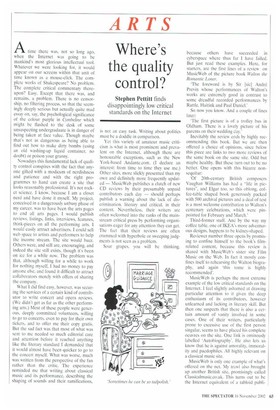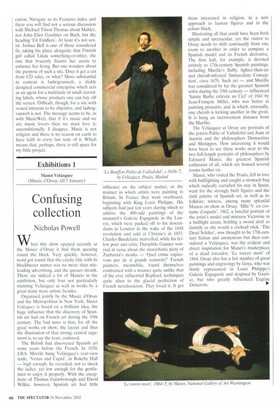Where's the quality control?
Stephen Pettitt finds disappointingly low critical standards on the Internet Atime there was, not so long ago, when the Internet was going to be mankind's most glorious intellectual tool. Whatever we were looking for, it would appear on our screens within that unit of time known as a mouse-click. The complete works of Shakespeare? No problem. The complete critical commentary thereupon? Easy. Except that there was, and remains, a problem. There is no censorship, no filtering process, so that the seemingly deeply serious but actually quite mad essay on, say, the psychological significance of the colour purple in Cymbeline which might be flashed to the desk of some unsuspecting undergraduate is in danger of being taken at face value. Though maybe that's not as dangerous as being able to find out how to make dirty bombs (using an old washing-up liquid container, no doubt) or poison your granny.
Nowadays this fundamental lack of quality control conspires with the fact that anyone gifted with a modicum of nerdishness and patience and with the right programmes to hand can create a site that looks reasonably professional. It's not rocket science. I know, because I am a closet nerd and have done it myself. My project, conceived in a dangerously unbusy phase of my career, was to have been the arts pages to end all arts pages. I would publish reviews, listings, links, interviews, features, think-pieces on all the performing arts. I would easily attract advertisers. I could sell web space to artists and performers to help the income stream. The site would buzz. Others were, and still are, encouraging, and indeed the site still exists, though its been on ice for a while now. The problem was that, although willing for a while to work for nothing myself, I had no money to pay anyone else, and found it difficult to attract collaborators merely with offers of sharing the company.
What I did find easy, however, was securing the services of a certain kind of contributor to write concert and opera reviews. (We didn't get as far as the other performing arts.) Most of these people were generous, deeply committed volunteers, willing to go to concerts, even to pay for their own tickets, and to offer me their copy gratis. But the sad fact was that most of what was sent to me needed so much editorial care and attention before it reached anything like the literary standard I demanded that it would almost have been quicker to go to the concert myself. What was worse, much was written from the perspective of the fan rather than the critic. The experience reminded me that writing about classical music and its performance, describing the shaping of sounds and their ramifications, is not an easy task. Writing about politics must be a doddle in comparison.
Yet this variety of amateur music criticism is what is most prominent and prevalent on the Internet, although there are honourable exceptions, such as the New York-based Andante.com. (I declare an interest: from time to time they use me.) Other sites, more slickly presented than my own and definitely more frequently updated — MusicWeb publishes a clutch of new CD reviews by their presumably unpaid contributors each day — should perhaps publish a warning about the lack of discrimination, literary and critical, in their content. Nevertheless, their writers arc often welcomed into the ranks of the mainstream critical press by performing organisations eager for any attention they can get. The fact that their reviews are often crammed with hyperbole or sweeping judgments is not seen as a problem.
Sour grapes, you will be thinking, because others have succeeded in cyberspace where thus far I have failed. But just read these examples. Here, for starters, are the first lines of a review on MusicWeb of the picture book Walton the Romantic Loner.
'The foreword is by Sir Isle] Andre Previn whose performances of Walton's works are extremely good in contrast to some dreadful recorded performances by Rattle, Haitink and Paul Daniel.'
So now you know. And a couple of lines later: The first picture is of a trolley bus in Oldham. There is a lovely picture of his parents on their wedding day.'
Inevitably the review ends by highly recommending this book. But we are then offered a choice of opinions, since below this piece are links to two more reviews of the same book on the same site. Odd but maybe healthy. But these turn out to be no better. One opens with this bizarre nonseq uitur:
'Of 20th-century British composers Vaughan Williams has had a -life in pictures", and Elgar too, so this oblong, coffee-table shaped book generously packed with 500 archival pictures and a deal of text is a most welcome contribution to Walton's centenary celebrations, which were pinpointed for February and March.'
Third-former stuff. And by the way my coffee table, one of IKEA's more adventurous designs, happens to be kidney-shaped.
Reviewer number three opens by promising to confine himself to the book's filmrelated content, because this review is shared with MusicWeb's sister site Film Music on the Web. In fact it mostly confines itself to rehearsing the Walton biography, and again 'this tome is highly recommended'.
MusicWeb is perhaps the most extreme example of the low critical standards on the Internet. I feel slightly ashamed at drawing particular attention to it given the deep enthusiasm of its contributors, however unlearned and lacking in literary skill. But then one suspects that there is also a certain amount of vanity involved in some cases. One of their writers, particularly prone to excessive use of the first person singular, seems to have placed his complete oeuvres on the site. One link is ominously labelled 'Autobiography'. He also lets us know that he is against amorality, immorality and paedophiles. All highly relevant on a classical music site.
MusicWeb is only one example of what's offered on the net. My trawl also brought up another British site, promisingly called Classicalmusic.co.uk. This turns out to he the Internet equivalent of a tabloid publi cation. Navigate to its Features index and there you will find not a serious discussion with Michael Tilson Thomas about Mahler. nor John Eliot Gardiner on Bach, but the heading 'Fit Fiddlers'. At least it's not sexist. Joshua Bell is one of those considered fit, taking his place alongside that Finnish girl called Linda something-or-other, the one that brazenly flaunts her assets to enhance her living. But one wonders about the purpose of such a site. Does it get a cut from CD sales, or what? More substantial in content is ludwigvanweb, a slickly designed commercial enterprise which acts as an agent for a multitude of small recording labels, whose products one can buy off the screen. Difficult, though, for a site with vested interests to be objective, and ludwigvanweb is not. The message seems to be, as with MusicWeb, that if it's music and we are music lovers then we must love it, unconditionally. I disagree. Music is not religion and there is no reason on earth to have faith in every last note of it. Which means that, perhaps, there is still space for my little project.



























































































 Previous page
Previous page